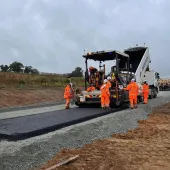Call for long-term investment in UK roads
Aggregate Industries say increase in pothole fund is welcome, but just a fraction of the amount needed
AGGREGATE Industries (AI) have welcomed the boost to the Government’s pothole fund, which will be increased by £200 million in the 2023/24 financial year. However, the company has warned that whilst the additional investment is much needed, a long-term investment in UK roads is a major requirement.
The Chancellor made the announcement as part of the Spring Budget and stipulated that the fund – which previously provided £500 million to councils annually – will be increased to £700 million in the next financial year. The Chancellor said the funding was to deal with ‘the curse of potholes’ in the hope that it will lower vehicle maintenance costs and safeguard the country’s road network for the future.
According to the Asphalt Industry Alliance (AIA), however, the cost of repairing potholed local roads in England and Wales is estimated to be £12.6 billion*; approximately £61,700 for every mile of local road. In addition, recent analysis by the Local Government Association showed government funding for maintaining England’s motorways and major A roads was 31 times higher per mile than for repairing local roads last year.
Thomas Edgcumbe, managing director of Surfacing Solutions at Aggregate Industries, said: ‘It’s really encouraging to see that the Government is increasing the pothole fund, and it will of course go some way in enabling local councils to fill the worst offenders. However, it is just a fraction of the amount needed to ensure our local roads meet the standards that we require for long-term use.
‘Potholes are symptomatic of poorly maintained roads and potential underlying structural issues. A long-term funding framework – as opposed to a reactive programme that allows local authorities to patch up parts of a road – will go a long way in preventing issues forming in the first place.
‘Investing in long-term, low-carbon and sustainable solutions is crucial in improving the structural conditions of our roads and safeguarding them for future use. This includes making use of the latest advances in sustainable products and practices, including innovative asphalt solutions.’
*Based on figures relating to the 2021/22 financial year. Figures for the 2022/23 financial year are due to be released by the AIA tomorrow (21 March)










